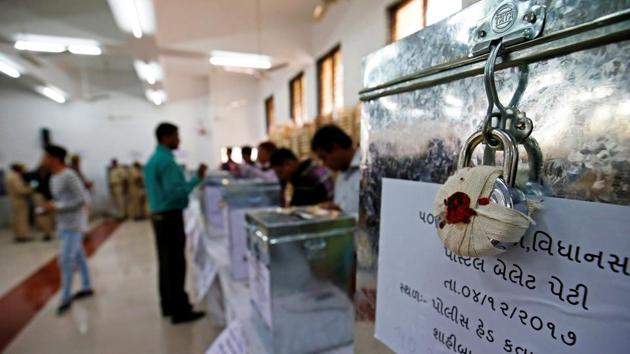Gujarat elections 2017: How local dynamics hold key in the polls
Seat dynamics are often far more important than the meta-narrative in determining voters’ choices.
Off the Rajkot-Amreli highway in Lilapur village, Rameshbhai is clear about his poll preferences. A voter in Rajkot’s Jasdan constituency, a Congress stronghold, he will vote for the BJP.

“The Congress has done nothing in the years it held this seat. For two and a half years, between 2009 and 2012, Bharat Boghra of the BJP was the MLA and he brought a high school and vikas (development) here. I will vote for him.” A few minutes into the conversation and there is a twist in the tale.
Boghra is from the Patidar community, so are Ramesh and most residents of Lilapur. When asked about the community’s unhappiness with the BJP, he says, “Yes, we are angry with the BJP. I don’t want it to form the government. But in this seat, I will vote for Bharatbhai. He is from my samaj.”
All politics is indeed local in this Gujarat election, particularly in the swing region of Saurashtra that sends 48 MLAs to the 182-member assembly. In this southwestern region that spans 11 districts, seat dynamics are often far more important than the meta-narrative in determining voters’ choices. Ramesh’s desire to see the BJP ousted in Gandhinagar but elected in Jasdan reflects how immediate loyalties overwhelm the larger anger.
On the other side, a considerable section among the Kolis, supposed to be BJP loyalists, is backing the Congress candidate, who is from their community, but wants the BJP in the state. It also illustrates the larger dilemma a Gujarati voter confronts in navigating local and provincial concerns, and the importance of smaller castes in determining the poll outcome. Jasdan votes on December 9. The second round of voting is on December 14.
Electing an MLA or a government
In Jasdan town, Nilesh Prajapati is doing his books as a group of customers wander around his shop.
Vithalbhai Patel, a farmer with about 10 bighas, says, “This is a Congress territory. Its candidate, Kunvarji Mohanbhai Bavaliya, is strong because he is a Koli and Kolis are the dominant group here. They are 80,000 or so and Patidars 55,000. We will vote for Bharatbhai.”
The Kolis are the dominant group among the many other backward classes in Gujarat.
Asked about the Patel anger, Prajapati’s words echo those of the voters in Lilapur. “I don’t like the BJP and don’t want it to win Gujarat, but I like my Patidar candidate,” he says.
It is to quell this larger community’s anger and to tap into local loyalties that the BJP has given more than 50 tickets to Patel candidates, far in excess of their population share of 12% among the state’s 60 million people.
“In the seats where the BJP has Patidar candidates, the community will not go against us. That is our calculation,” a BJP activist in Rajkot said. If Patel voters in Jasdan care more for their local leader, others like
Prajapati wants to be on the right side of the dispensation in Gandhinagar.

“See, we have been electing the Congress but the BJP is in power in Gandhinagar. So our work gets stuck. We still have water issues. It is better to have an MLA from the ruling party, I will vote for the BJP,” says Prajapati.
But at a time when there is speculation that the Congress could make a comeback after 22 years, would it not make sense to stick with it? Prajapati laughs. “No, Congress can’t win at the top. It will be a waste to have an opposition MLA again. There are 18 smaller castes like Prajapatis, Darjis, Brahmins, Banias and others. If Patidars and our castes come together, the BJP wins.”
The other side
If the Patels want the BJP to win the seat and lose the state, the Kolis want the opposite.
And, this gives Congress’s Bavaliya the edge, for Kolis outnumber other communities. Add to it the Patidar anger and his credentials — a former MP and MLA — and Bavaliya is in business.
“Kunvarji has been our leader for many years. He will take care of the constituency,” Binodbhai Rajabhai says, only to add the BJP should win the state. “The Congress can’t run Gujarat,” says the man from Baldoi, who drives a tractor for a living.
In Amrapur, opinion is divided. Ramesh Bhai sits in his tailoring shop.

“Kunvrji is a local. If we have work, we can go to him. So our support is for the Congress,” says Ramesh, who is from the Darji (tailor in Hindi) community. But some distance away, at a small dairy, where a picture of the Amul pioneer Verghese Kurien hangs on a wall, Mukeshbhai, a Koli, is all for the BJP.
“The Congress has done nothing in all these years. Modi brought water, road, electricity, education and vikas,” he says referring to Prime Minister Narendra Modi, who was the chief minister before the BJP swept the 2014 Lok Sabha election.
Dairy cooperatives are a BJP stronghold and professional affiliations rather than caste may well explain Mukesh’s decision.
The complexities of this one constituency show how the state election is being fought at a micro level. And, in that lies the limit of overarching narratives.




